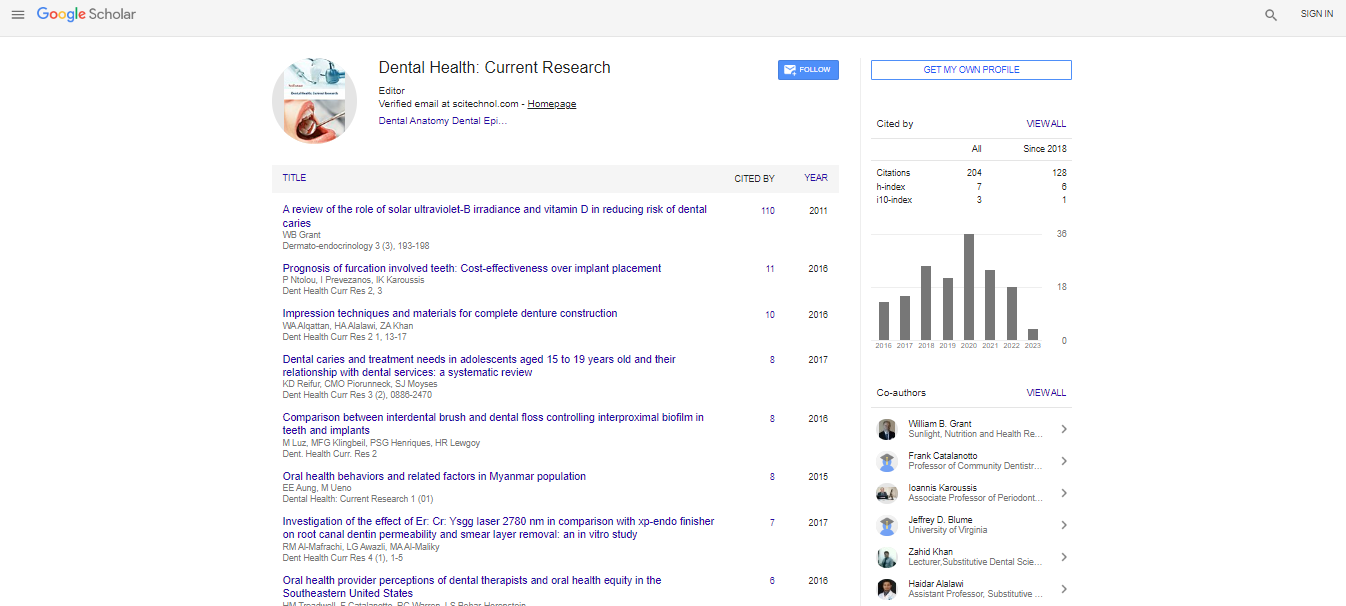Opinion Article, Dent Health Curr Res Vol: 10 Issue: 3
Fluoride's Role in Preventing Tooth Decay and Strengthening Enamel
Jeahrisoux Valenterger*
1Department of Preventive and Restorative Dental Sciences, University of California San Francisco, San Francisco, USA
*Corresponding Author: Jeahrisoux Valenterger,
Department of Preventive and
Restorative Dental Sciences, University of California San Francisco, San Francisco,
USA
E-mail: jeahrisouxvale@gmail.com
Received date: 28 May, 2024, Manuscript No. DHCR-24-137160;
Editor assigned date: 30 May, 2024, Pre-QC No. DHCR-24-137160 (PQ);
Reviewed date: 14 June, 2024, QC No. DHCR-24-137160;
Revised date: 21 June, 2024, Manuscript No. DHCR-24-137160 (R);
Published date: 28 June, 2024, DOI: DOI: 10.4172/2470-0886.1000218
Citation: Valenterger J (2024) Fluoride's Role in Preventing Tooth Decay and Strengthening Enamel. Dent Health Curr Res 10:3.
Description
Maintaining oral health is important for overall well-being, and one of the key elements in achieving this is fluoride. This naturally occurring mineral has been recognized for its significant role in preventing tooth decay and strengthening tooth enamel. Despite its widespread use and proven benefits, understanding how fluoride works can help individuals appreciate its importance and ensure they are using it effectively in their oral hygiene routines.
Fluoride is a mineral found in various natural sources, including water, soil, plants, rocks, and air. It is also added to public water supplies, dental products like toothpaste and mouth rinses, and is available in professional treatments at dental offices. The primary reason for its inclusion in these products is its ability to combat tooth decay and reinforce tooth enamel. Tooth enamel is the hard, outer surface of the teeth that protects them from decay. When we consume foods and drinks, especially those high in sugars and starches, bacteria in the mouth produce acids that attack the enamel. Fluoride helps to remineralize the enamel, making it more resistant to these acid attacks. This process, known as remineralization, helps repair minor enamel damage and restores the mineral content lost during demineralization. Tooth decay occurs when the enamel is continuously attacked by acids and breaks down, leading to cavities. Fluoride not only aids in remineralization but also inhibits the activity of bacteria that produce these harmful acids. By disrupting the acid production process, fluoride reduces the risk of cavities and helps maintain a healthier oral environment.
When fluoride is incorporated into the enamel, it forms a compound called fluorapatite. This new form of enamel is more resistant to acid than the original hydroxyapatite, providing an additional layer of defense against decay. Fluorapatite enhances the enamel's durability and helps maintain its integrity over time. Community water fluoridation is one of the most effective public health measures for preventing tooth decay. By adjusting the fluoride concentration in public water supplies to optimal levels, communities can significantly reduce the incidence of cavities among residents. Most toothpaste brands contain fluoride, which helps protect teeth with every brushing. Fluoride mouth rinses offer additional protection, especially for individuals at higher risk of decay. Using fluoride toothpaste and rinses regularly ensures continuous exposure to this beneficial mineral. Dentists offer professional fluoride treatments in the form of gels, foams, or varnishes. These treatments contain higher concentrations of fluoride and provide a powerful boost to enamel strength. They are especially beneficial for individuals with a history of cavities or those undergoing orthodontic treatment, which can increase the risk of decay.
In areas where water is not fluoridated, or for individuals who need additional fluoride, dietary supplements in the form of tablets, drops, or lozenges may be prescribed by a dentist or physician. While fluoride is highly beneficial in preventing tooth decay, it is essential to use it appropriately to avoid overexposure. Excessive fluoride intake during the early years of tooth development can lead to dental fluorosis, a condition that causes discoloration and pitting of the enamel. Use fluoride products as directed by dental professionals. For children under six, supervision is necessary to prevent swallowing toothpaste or mouth rinses. Be aware of the fluoride levels in your local water supply. If you live in an area with non-fluoridated water, consider fluoride supplements or professional treatments. Regular dental checkups allow your dentist to assess your fluoride needs and recommend appropriate treatments or products.
Conclusion
Fluoride plays a key role in preventing tooth decay and strengthening enamel. Its ability to remineralize enamel, inhibit acidproducing bacteria, and form stronger fluorapatite makes it a vital component of oral health care. By incorporating fluoride through water, dental products, and professional treatments, individuals can protect their teeth from decay and maintain a healthy smile. Understanding and utilizing fluoride effectively ensures that we can enjoy its benefits while minimizing the risks associated with overexposure. For personalized advice on fluoride use, consulting with a dental professional is always the best course of action.
 Spanish
Spanish  Chinese
Chinese  Russian
Russian  German
German  French
French  Japanese
Japanese  Portuguese
Portuguese  Hindi
Hindi 